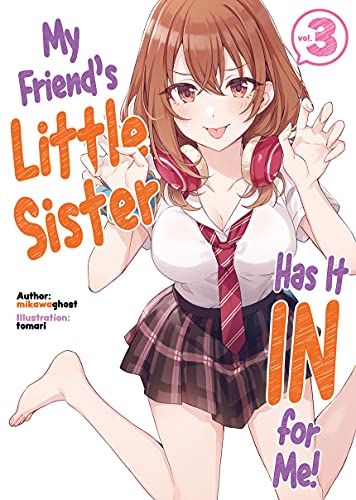By mikawaghost and tomari. Released in Japan as “Tomodachi no Imouto ga Ore ni dake Uzai” by GA Bunko. Released in North America by J-Novel Club. Translated by Alexandra Owen-Burns.
Despite the presence of some of the worst metaphors in the world, this is a better volume than the previous one, mostly because it doesn’t keep hammering on Sumire’s love of young boys. It essentially wraps up the plot from the previous book in the first half, leaving the 2nd half to delve deeper into one of the characters who we’ve been waiting to hear more about: our narrator, Akiteru. Well, sorry to break it to you, but we still don’t learn all that much about him. That said, it’s a good examination of his mindset and how he views himself compared to the others in the group, and a reminder that sometimes middle management really *is* the best skill to have. And of course there’s romance – Akiteru may be slowly (very, very slowly) catching on to what love actually feels like, and iroha reminds the other two heroines that she is still Best Girl round these parts.
Of course, given that Iroha has been on the cover of every volume to date, the idea that this is an ‘equal harem’ series is ridiculous. We start off where we left off, with Akiteru and Iroha in the shrine of love. Unfortunately, the shrine of love does not come with a toilet, so any deep sexual yearnings will have to wait. And, in any case, the real issue resolved here is Sumire’s desire to be an artist warring with her desire to be a teacher. It helps that, in the best Japanese tradition, her stern, unyielding grandfather turns out to be quite yielding after all. Then our heroes finally get a beach vacation, at Canary’s private beach house. Of course, there’s a catch. While brainstorming a new character, Canary essentially comes up with it herself. And also is better at forcing Sumire to work. And their “ghost” writer too. Is… is there anything for Akiteru left to do?
The main reason to read this series is still the two leads, who are the best thing about it. Akiteru may talk a good game about being logical and pragmatic, but he’s repressing an awful lot, and seeing how well Canary can seemingly do what he does every day gets him depressed and jealous. And, of course, it’s up to Iroha to do something about this. I like how her pep talk does help to cheer him up, but it’s not the actual solution – the solution is that Akiteru really *is* better at managing a bunch of eccentrics, as Canary finds out to her horror. (That said, she was doing this to test him anyway.) We’re also seeing secret identieis out in the open – Sumire now knows who Mashiro really is, and Ozuma has figured out who the “secret voice actress” is as well. This sort of series can’t resolve too quickly, but it’s nice to see it determined to move forward a plot point of two each volume.
There’s a cliffhanger that suggests the next book might be a bit more uncomfortable for Akiteru. Till then, this is a decent high school romcom with likeable characters, except for Sumire sometimes, and great dialogue, except for Sumire all the time. Seriously, “the dick in my heart won’t get hard”? That’s the metaphor you go with?



